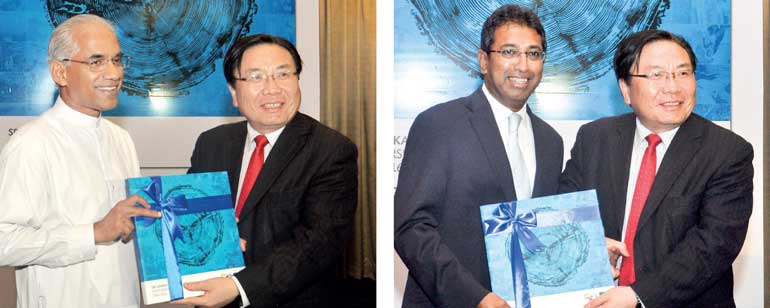Friday Feb 27, 2026
Friday Feb 27, 2026
Thursday, 30 November 2017 00:55 - - {{hitsCtrl.values.hits}}
 Asian Development Bank (ADB) Vice President (Operations 1) Wencai Zhang presents the ‘Sri Lanka-ADB Partnership: 1966-2016’ coffee table book to Chief Guest State Minister of Finance Eran Wickramaratne and National Policies and Economic Affairs Deputy Minister Harsha De Silva - Pix by Ruwan Walpola
Asian Development Bank (ADB) Vice President (Operations 1) Wencai Zhang presents the ‘Sri Lanka-ADB Partnership: 1966-2016’ coffee table book to Chief Guest State Minister of Finance Eran Wickramaratne and National Policies and Economic Affairs Deputy Minister Harsha De Silva - Pix by Ruwan Walpola
The Asian Development Bank (ADB) is reaffirming its long-term partnership with the Sri Lankan Government to continue helping the country achieve its development goals, ADB Vice-President Wencai Zhang said during an event in Colombo to celebrate 50 years of ties between ADB and Sri Lanka.
A publication ‘Sri Lanka-ADB Partnership: 196G-2016’ was jointly launched at the event by State Minister of Finance and Mass Media Eran Wickramaratne and Zhang last week.
The book traces the history of ADB’s projects in the country and how the organisation has contributed to strengthening Sri Lanka’s economy. The book depicts the full range of Sri Lanka-ADB projects, including in agriculture, industry, infrastructure and education, chronicling a significant part of the country’s development journey as it moves toward becoming an upper middle-income country.
“As one of the founding member countries, Sri Lanka played a pivotal role in ADB’s establishment in 1966,” said Zhang.
ADB’s first loan to Sri Lanka was approved in 1968 to help modernise tea factories. Since then ADB has been one of Sri Lanka’s largest development partners, providing more than $ 8.9 billion in loans, technical assistance and grants as of October 2017.
Over the past 50 years ADB has helped upgrade vital infrastructure, improve education and skills-based training and prepare and implement reconstruction in conflict- and tsunami-affected areas. ADB has also supported the growth of small- and medium-sized enterprises, development of agriculture and natural resources and management of the public sector.
The book launch event was organised by the ADB Sri Lanka Resident Mission, which also celebrates 20 years since its establishment in October 1997. Key ADB partners in Sri Lanka including government officials, private sector representatives, development partners, diplomatic community and members of the media were in attendance.
During his visit, Zhang met with President Maithripala Sirisena, the Minister for Finance and Mass Media and ADB Governor for Sri Lanka Mangala Samaraweera and other key Government officials, discussing the newly-approved Country Partnership Strategy for 2018- 2022.
The first copies of the newly published Employment Diagnostic Study ‘Sri Lanka: Fostering Workforce Skills through Education’ was presented to the President and Minister of Finance and Mass Media during the bilateral meetings.
This study examines labour market issues such as improving the economy’s skill base and challenges arising from an ageing population and offers solutions specific to Sri Lanka.
Zhang also witnessed the loan-signing of two ADB-funded projects. ADB Country Director Sri Widowati signed on behalf of ADB and R.H.S. Samaratunga, Secretary to the Treasury, Ministry of Finance and Mass Media, signed on behalf of the Sri Lankan Government. The loan agreement is for the Second Integrated Road Investment Program.
Widowati and Chairman W.B. Ganegala and Ceylon Electricity Board Vice-Chairman W.A. Gamini Wanasekara signed the loan agreement for the Wind Power Generation Project. Zhang also visited the Senanayake National School in Madampe, road projects in the Northern and North Central provinces, and a desalination plant on Delft island, all supported by ADB-funded projects.
ADB, based in Manila, is dedicated to reducing poverty in Asia and the Pacific through inclusive economic growth, environmentally sustainable growth and regional integration.
Established in 1966, ADB is celebrating 50 years of development partnership in the region. It is owned by 67 members - 48 from the region. In 2016, ADB assistance totalled $ 31.7 billion, including $ 14 billion in co-financing.